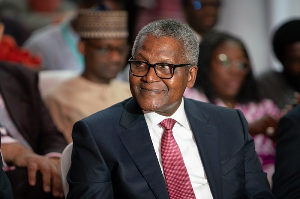The Kofi Annan International Peacekeeping Training Center (KAIPTC) has organised an open day forum with a call on corporate bodies and individuals to embrace security as a communal duty and contribute towards peace-building efforts.
“The provision of peace and security is a shared responsibility, which needs to be wholly embraced by all stakeholders,” Dr Benjamin Kunbuor, the Minister of Defence, said at the forum on Thursday.
The meeting was held to discuss issues of the peacekeeping training center as well peace and security in the country.
It also served as a platform to engage stakeholders to explore possibilities for peace-building.
Dr Kunbuor said the peacekeeping training centre was privileged to enjoy tremendous support from a number of development partners such as countries, regional and international institutions over the last decade.
He observed that the support gathered from those bodies had led to the expansion of the centre’s activities, and culminated in building and reinforcing its status as a regional centre of excellence for peace and security recognised by ECOWAS.
Dr Kunbuor said the centre would broaden its collaboration with new partners, most especially, the private sector in the next decade to better deal with security and in a proactive manner.
“Over the years, KAIPTC has achieved a lot in the area of peace and security, as well as building capacities of over 12,000 civilians, military and police personnel who work to promote peace and development across Africa,” he said.
Dr Kunbuor noted that it was only through adequate security, safe and conducive environment that people could collectively undertake their businesses.
Dr Kwesi Aning, Director, Faculty of Academic Affairs and Research at KAIPTC, expressed worry that West Africa was awashed with weapons, easily patronised by “all manner of persons and groups including terrorists, politicians, hunters and petty and violent criminals.”
He noted that it was as a result of illicit small arms and ammunition that led to the killing and maiming of thousands of people in Liberia, Sierra Leone and Cote d’Ivoire, which had been augmented by additional inflows from Libya.
He said a national baseline study undertaken by KAIPTC has estimated that there were about 2.3 million small arms available in Ghana.
Out of the number, 39 percent are in the Northern Region, while 19 percent are in the Ashanti Region, 17 percent are in the Brong Ahafo Region and 16 per cent in the Greater Accra Region.
He said the regions with the least incidence of small arms availability are Central Region which has eight per cent and Upper East Region - Nine per cent.
Dr Aning said the phenomenon required reforms in the areas of legislation overhaul, commitment to enforce legal regimes, and community involvement in arms and ammunition control planning and implementation initiatives.
General News of Saturday, 20 June 2015
Source: GNA













